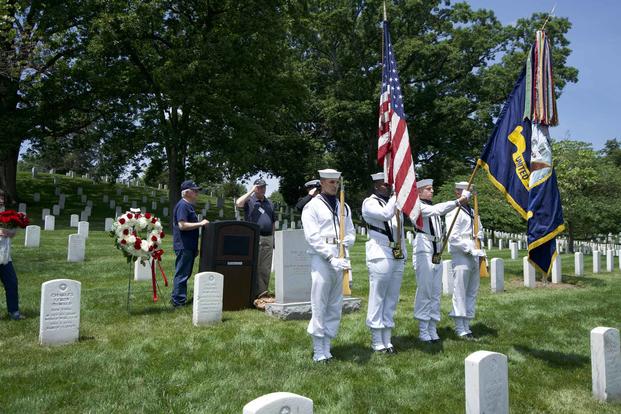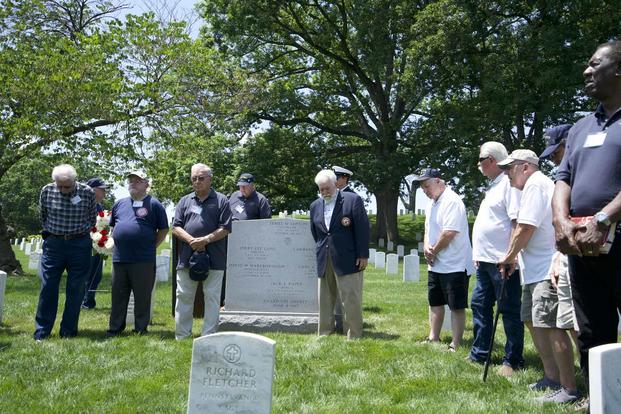In Section 34, at the center of a green oasis on the south side of Arlington National Cemetery, about 50 men and women gathered around a stone slab with six names on it. Many sought shelter on chairs in the shade and others wavered, rocking on sea legs and canes, in the June heat.
The survivors of the attack on the USS Liberty — an event that happened 55 years ago — snapped salutes as the president of the USS Liberty Veterans Association, Larry L. Bowen, began a remembrance ceremony Wednesday.

Israeli munitions ripped through the Belmont-class research ship with strafing fire, napalm and torpedoes as it patrolled Mediterranean waters performing signal intelligence — “spy” — missions during the 1967 Six-Day War between Israel and a coalition of Arab countries.
“Heroism was the order of the day, and every man who could help, stepped up to help,” said Bowen.
The attack, which left 34 Americans dead and 174 others injured — two-thirds of the crew in total, according to a press release organized by the Liberty Veterans Association — has been veiled in controversy since it happened, with survivors, and even some former senior intelligence officials, pointing to a deliberate bombardment by Israel and a subsequent U.S. dismissal of the event to pardon its ally.

“For 55 years, we’ve tried to honor the crew, with little to no support from our government, just like the lack of support we received when we were under attack,” Bowen continued from the podium. “Our government has tried to cover the entire attack up as a mere accident. Nothing could be further from the truth.”
The story of the USS Liberty has teetered on the border of erasure and notoriety for decades. The ship had one of the most highly decorated naval crews in U.S. history, earning one Medal of Honor for the ship’s commander, Capt. William L. McGonagle, and hundreds of other commendations from the attack. Yet even after the mid-2000s, when the National Security Agency declassified bits and pieces of the event, some of which contradicted previous official accounts of the attack, the ship’s history is still inconvenient for the U.S government, according to the ship’s survivors.
Joe Meadors, a Liberty survivor and Navy signalman, was barely in his twenties during the attack. Now, in his 70s, he says he remembers that afternoon clearly.
“I was up on the signal bridges,” he said. “Watching the first attacking aircraft and their wings light up with machine guns, side by side. I’ll never forget.”
He remembers the reconnaissance flights earlier in the morning and says that a “spy” on board told him “not to worry about it,” the Israelis were reporting that they had identified the ship as American.
“Some of them were low enough that we could wave to the pilots, and then the deck plating would rattle,” he said.

Throughout the ceremony, between the speakers and murmurs within the crowd, the discontent with the alleged cover-up and lack of recognition by the U.S. government was palpable.
“Parents deserve to know the truth, Americans deserve to know the truth about what happened,” said Meadors. “We’re fed up with it.”
The Attack
In the early hours of June 8, 1967, an Israeli aircraft took off on a routine reconnaissance patrol over the Mediterranean, according to a review of the incident conducted by the Israeli Defense Forces. The plane identified a ship 70 miles west of Gaza, but could not determine its country of origin. Somewhere ashore, an Israeli intelligence officer marked the ship’s location with a red flag on a map board, indicating it could not be identified clearly.
As unknown aircraft circled, the Liberty sat exposed in the open sea. The ship contacted command, relaying that the crew intended to destroy sensitive documents aboard to prevent their capture.
Eighteen minutes after the Liberty was first seen, the Israeli aircraft identified it as a U.S. Navy ship, yet the marker remained red on the board of Israel’s Central Coastal Command until 9 a.m. when it was switched to green, indicating the ship was indeed “neutral.” But as Syrians battered Israel’s front lines and Egyptian submarines prowled the sea, the green marker, according to the Israelis, became an afterthought.
By the evening of June 8, the Liberty — which was armed with only a handful of .50-caliber machine guns — was nearly sunk. A barrage of torpedoes slammed into the ship’s hull as Israeli aircraft dropped napalm and strafed her deck repeatedly. The attack lasted two hours, according to Bowen.
Dozens of Americans were dead, and the questions of why and how hung over the survivors, and public and defense officials in the wake of the attack and the brief war.
Barely 20 days later, the Navy said it had an answer to what had happened or, rather, a partial one: The Liberty was doing its duty, the attack was unprovoked, Israel had “ample time” to identify the ship, but the U.S. could not identify the reason for the attack, according to a 1967 Department of Defense press release. The U.S. government has never publicly blamed Israel for anything other than an accident.
The Liberty’s survivors say that Israel had to have known that the vessel was American — flying an American flag — and the attack was made without warning or justification.
Frank Spicher, a 56-year-old Maryland resident, was at Arlington on Wednesday in remembrance of his father, Petty Officer 2nd Class John C. Spicher, a Navy postal clerk who was killed during the attack.
Though the younger Spicher was approaching two years old at the time of the attack, he says his first memory was of burying his father at Arlington; he was on his grandfather’s shoulders, his small head sliding under the canopy that protected the ceremony from the rain that day.
“For 10 or 12 years, the last thing that I heard when I fell asleep at night was this crack, and I had no idea what it was,” he said. “Years went by before I realized, when I had seen it on TV on Memorial Day, it was actually a 21-gun salute somewhere in the cemetery.”
“That is what my memory is,” he added.
Spicher recounted coming to the reunion almost every time it had occurred over the years, speaking with survivors who knew his father who told him that the elder Spicher bravely tried to put out napalm fires as strafing fire continued to pepper the deck. He said that as his father ducked under a bulkhead, a rocket hit the door, fatally wounding him. Other survivors tried to save John Spicher, conducting CPR and even performing a tracheotomy, not realizing the deadliest wounds were on his back.
“To those guys that were there, I am a bit of a trigger,” he said. “It’s hard for me to be here because I realize I look too much like my dad to them,” adding that he named his daughter Liberty to keep his father’s memory alive.
In 2005, the USS Liberty Veterans Association submitted a report to the DoD asking for a formal investigation, unsatisfied by the Navy’s 1967 inquiry. The report, summarized by the survivors, in part said that their radios were jammed, preventing distress frequencies from reaching superiors; the Israeli aircraft attacking the Liberty were unmarked; and the planes deliberately strafed their life rafts, anticipating that the sailors would abandon ship.
“We the surviving crew members will not let the cover up continue as long as we live,” said Bowen.
— Drew F. Lawrence can be reached at drew.lawrence@military.com. Follow him on Twitter @df_lawrence.
Related: Ingalls Christens its 10th Legend-Class National Security Cutter



![Israeli soldiers in the West Bank on 14 February 2020 [Issam Rimawi/Anadolu Agency]](https://i0.wp.com/www.middleeastmonitor.com/wp-content/uploads/2020/02/20200214_2_40852985_52161315.jpg?resize=1200%2C800&quality=85&strip=all&zoom=1&ssl=1)


















